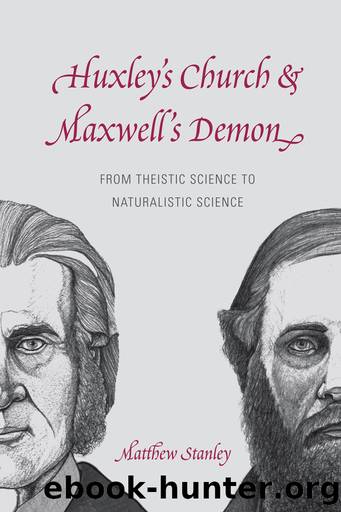Huxley's Church and Maxwell's Demon by Matthew Stanley;

Author:Matthew Stanley; [Stanley, Matthew]
Language: eng
Format: epub
Publisher: University of Chicago Press
Published: 2014-11-15T00:00:00+00:00
CHAPTER SIX
Free Will and Natural Laws
The question was whether you could decide what to have for dinner. Did you have the freedom to choose? Victorian societyâs base assumption was that the soul and will could act freely, whether to select a meal or to accept divine grace. Being divinely created and endowed, the soul was qualitatively different from the crude matter around it and was thus exempt from having all its future states already determined as a rolling billiard ball would.1 The mystery of how the soul drove the body gave rise to detailed, largely fruitless analyses, but was widely accepted as obviously true.2
But there was another option.
Perhaps the mind was not so different from the billiard ball. Perhaps the natural laws that allowed exact prediction of the motion of the planets also constrained the thoughts in our heads, making our choice of dinner an inevitable result of hidden processes. Conceptually, this was a straightforward move. A scientific investigator simply had to extend the uniformity of nature (as discussed in chapter 2) to the mind. There were many precedents for a science of mind, though confusion remained about precisely what it meant to have the mind as a scientific object.3
Huxley and the scientific naturalists took this even further. Applying the uniformity of nature to the mind, they said, demanded that animals and humans be considered as automata.4 The original Greek term meant a self-moving object, but in the eighteenth century it came to refer to an entity incapable of free will, a soulless machine. The stupid, the oppressed, the conforming aristocrat, the inflexible tyrant were all automata.5 Huxleyâs choice of this term thus explicitly invoked the political, social, and theological stakes that the Enlightenment had invested in human volition. To most contemporaries, moral order seemed impossible without an immortal soul able to affect its environment. Roger Smith argues that, even beyond moral order, the freedom of the will seemed essential for the universe to be understood in human terms at all. Without volition, there could be no purpose to life.6
It was on this issueâfreedom of the willâthat we can see the formation of the deepest fractures between theism and naturalism in Victorian science. This chapter will not survey the voluminous Victorian literature on free will. Rather, it will focus on the will as an expanding boundary between naturalistic and theistic approaches to science. The point of contest was whether it was acceptable and meaningful to include the mind in the uniformity of nature. Was consciousness an object governed by natural laws? Or was it of a different order entirely? Theistic and naturalistic scientists had been able to find common ground in a lawful nature, the role of hypotheses, educational systems, and intellectual freedom. But free will was the fault line from which they began to diverge profoundly.
The Victorian Mind-Body
The first half of the nineteenth century saw remarkable shifts in the understanding of the relationship between the human body and mind. The growing acceptance that the study of the mind should
Download
This site does not store any files on its server. We only index and link to content provided by other sites. Please contact the content providers to delete copyright contents if any and email us, we'll remove relevant links or contents immediately.
The Lost Art of Listening by Michael P. Nichols(7170)
Why I Am Not A Calvinist by Dr. Peter S. Ruckman(4051)
The Rosicrucians by Christopher McIntosh(3375)
Wicca: a guide for the solitary practitioner by Scott Cunningham(3046)
Signature in the Cell: DNA and the Evidence for Intelligent Design by Stephen C. Meyer(2879)
Real Sex by Lauren F. Winner(2873)
The Holy Spirit by Billy Graham(2782)
To Light a Sacred Flame by Silver RavenWolf(2681)
The End of Faith by Sam Harris(2637)
The Gnostic Gospels by Pagels Elaine(2403)
Waking Up by Sam Harris(2334)
Nine Parts of Desire by Geraldine Brooks(2283)
Jesus by Paul Johnson(2232)
Devil, The by Almond Philip C(2207)
The God delusion by Richard Dawkins(2192)
Heavens on Earth by Michael Shermer(2191)
Kundalini by Gopi Krishna(2094)
Chosen by God by R. C. Sproul(2058)
The Nature of Consciousness by Rupert Spira(1983)
